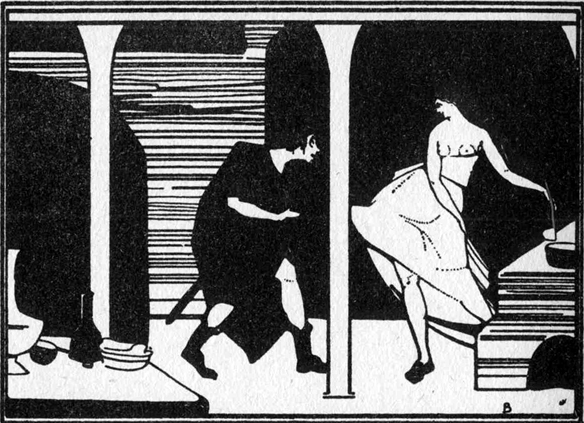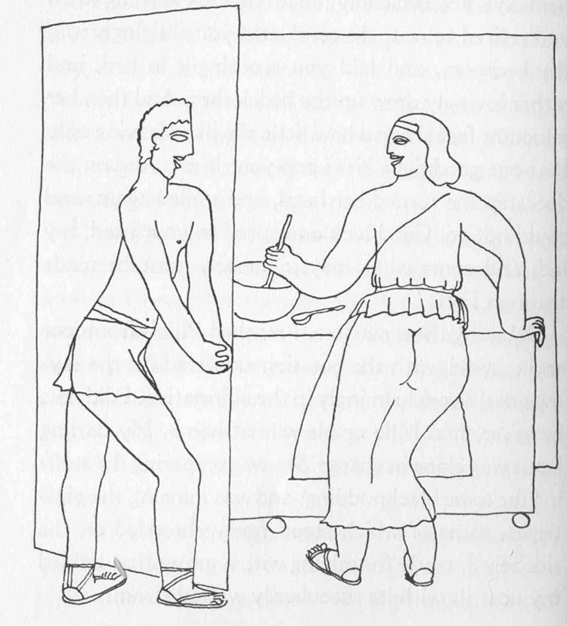APVLEI METAMORPHOSEON LIBER II [7]
‘Nec tamen domi Milonem vel uxorem eius offendo, sed
tantum caram meam Photidem: suis parabat isicium fartim concisum et pulpam
frustatim consectam ambacupascuae iurulenta et quod naribus iam inde ariolabar,
tuccetum perquam sapidissimum. Ipsa linea tunica mundule amicta et russea
fasceola praenitente altiuscule sub ipsas papillas succinctula illud cibarium
vasculum floridis palmulis rotabat in circulum, et in orbis flexibus crebra
succutiens et simul membra sua leniter inlubricans, lumbis sensim vibrantibus,
spinam mobilem quatiens placide decenter undabat. Isto aspectu defixus obstupui
et mirabundus steti, steterunt et membra quae iacebant ante. Et tandem ad
illam: "Quam pulchre quamque festive," inquam "Photis mea, ollulam istam
cum natibus intorques! Quam mellitum pulmentum apparas! Felix et <certo>
certius beatus cui permiseris illuc digitum intingere." Tunc illa lepida
alioquin et dicacula puella: "Discede," inquit "miselle, quam procul a meo
foculo, discede. Nam si te vel modice meus igniculus afflaverit, ureris intime
nec ullus extinguet ardorem tuum nisi ego, quae dulce condiens et ollam et
lectulum suave quatere novi."’
LINDSAY TRANSLATION (1932) pp. 35-37
|
‘Fotis was alone in charge. She was preparing the stuffing for some
blackpudding, and was mincing the pigs-tripes, some of which stood finely
shredded on the sideboard, ready for mixing with a gravy that tickled my
nostrils with its succulently wafted steam. She was neatly clad in a linen
apron, with a shining scarlet stomacher which gathered her dress up high
under her meeting breasts; and she was stirring the stockpot with her rosy
little hands moving round and round above it. As she stirred and turned
the meat, she herself stirred and vibrated congruously all over her supple
body. Her loins softly undulated, and her agile spine swayed and rippled
in time, as she placidly stirred the pot.
I was entranced by the sight, and stood in mute admiration—as
did that part of me which so far had not intruded. At last I addressed
the girl, “How finely, my dear Fotis, how gaily you stir your buttocks
as you stand over the pot. What a honeyed relish I see you getting ready.
A happy man, a blessed man, is he that you will let dip finger there.”
“Be off, you poor fellow,” answered the young chatterbox, never
at loss for a repartee. “Be off from my fire-place. Keep your distance.
For if the tiniest spark of that heat grazes you, you’ll be scorched to
the gizzard, and no one will be able to quench you but myself. For I’m
very good at putting a choice spice into pot or bed, and making them both
equally stirring.”’
|

Fotis stirring her
pot and Apuleius - illustration by Jean de Bosschère
|
GRAVE'S TRANSLATION (1950) pp. 30
‘I found nobody at home but my charming Fotis who was
preparing pork-rossoles for her master and mistress, while the appetizing
smell of haggis-stew drifted to my nostrils from an earthenware casserole
on the stove. She wore a neat white house-dress, gathered in below the breast
with a red silk band, and as she alternately stirred the casserole and shaped
the rissoles with her pretty hands, the twisting and turning made her whole
body quiver seductively.
The sight had so powerful an effect on me that for awhile I stood
rooted in admiration; and so did something else. As last I found my voice.
“Dear Fotis,” I said, “how daintily, how charmingly you stir that casserole:
I love watching you wriggle your hips. And what a wonderful cook you are!
The man whom you allow to poke his finger into your little casserole is the
luckiest fellow alive. That sort of stew would tickle the most jaded palate.”
She retorted over her shoulder: “Go away, you scoundrel; keep clear
of my little cooking stove! If you come too near even when the fire is low,
a spark may fly out and set you on fire; and when that happens nobody but
myself will be capable of putting the flames out. A wonderful cook, am I?
Yes, I certainly know how to tickle a man’s . . . well, his palate, if you
care to call it that, and how to keep things nicely on the boil—between the
sheets as well as on a kitchen-stove.”’
WALSH'S TRANSLATION (1994) pp. 22-23
‘I found neither Milo nor his wife at home, but only
my dear Photis. She was cooking minced pork for stuffing, and slices of meat,
and some very spicy sausage of which I had already caught a whiff. She was
wearing an elegant linen dress, with a bright red belt fastened up supporting
her breasts. As she turned the casserole-dish round and round with her petal-like
fingers, and as she wriggled her supple spine, her person rippled most attractively.
I was spellbound at the sight, and stood there lost in admiration. The parts
of me that were asleep before now stood to attention. Finally I managed
to speak to her; “My dear Phots,” I said, “how lusciously and attractively
you wiggle that wee pot, and your bottom with it! That’s a succulent dish
you have in readiness there! How lucky a fellow would be if you let him
stick his finger in—he’d be on top of the world!”
That pert and witty girl at once replied: “Keep clear, poor boy,
keep clear as far as possible from this stove of mine. If once my little
flame shoots out and as much as sears you, you will be all ablaze inside,
and I’ll be the only one who can put your fire out. The spices which I incorporate
are sweet. I’m an expert at pleasurably shaking a bed as well as a pot.”’
KENNEY'S TRANSLATION (1998) pp. 25-26
‘I found neither Milo nor his wife at home, but only
my dear Photis. She was getting dinner ready: pork rissoles, a succulent
stew…and – I could smell it from outside – a splendidly savoury pâté.
She was wearing a neat linen tunic, with a bright red waistband seductively
gathered up high under her breasts. Her pretty hands were engaged in stirring
the pot with a brisk circular movement, to which her whole body kept time
in a sinuous response, while her hips and supple spine swayed in a delightfully
undulating rhythm. I stood in amazement, my attention riveted, admiring the
sight; and something else stood to attention as well. Finally I said, “How
prettily, darling Photis, you’re stirring that pot, and what a jolly rearguard
action! That’s a delicious stew that you’re cooking! It’d be a lucky chap
with nothing more to wish for in this world that you allowed to dip his
finger in there.” To which the witty little baggage answered: “You stay
away, right away, from my little hearth, or it’ll be the worse for you.
You’ve only to be touched by my tiniest spark, and you’ll take fire and
burn deep down inside you—and nobody will be able to put out the flames
but me. I know all the best recipes, and I’m equally good at keeping things
on the move in the kitchen and in bed.”’
BOHN'S LIBRARY TRANSLATION (1902) pp. 28-29
‘[I found there] only my charmer Fotis, who was preparing
some sausages for her master and mistress; she had some minced meat on a
platter, ready to mix with gravy, which, as my nostrils augured, was very
savoury.
She was neatly dressed in a linen garment, gathered in by a
bright red sash, just below her breasts, and as she stirred the saucepan
round and round by a circular movement of her rosy hand, her supple form
partook in the motion, her loins vibrated, and her flexible spine was thrown
into charming undulations.
 Fotis stirring her pot and Apuleius
- illustration by Percival Goodman
Fotis stirring her pot and Apuleius
- illustration by Percival Goodman |
Entranced by the sight, I stood gazing in admiration;
all my passions, which before lay dormant, were aroused. At last I said
to her, “With what a graceful, what a delightful twist of your hips, you
stir that saucepan, my Fotis! what honeyed dish are you preparing? Happy,
and most surely blessed is he, who is allowed by you to dip this finger
therein.”
“Begone, unhappy wight,” cried the sprightly chatter-box, “begone
as far as you can from my fire; for if but a spark of it touch you, you
will be burnt to the vitals; and there will be no one to extinguish your
heat but myself, who know equally well how to provide a zest for bed and
board.”’
ADLINGTON TRANSLATION (1639) pp. 34-35
‘When I was within the house I found my deare
and sweet love Fotis mincing of meat and making pottage for her master and
mistresse, the Cupboord was all set with wines, and I thought I smelled
the savor of some dainty meats: she had about her middle a white and clean
apron, and shee was girded about her body under the paps with a swathell
of red silke, and she stirred the pot and turned the meat with her faire
and white hands, in such sort that with stirring and turning the same her
loynes and hips did likewise move and shake, which was in my mind a comely
sight to see. These things when I saw I was halfe amazed, and stood musing
with my selfe, and my courage came then upon mee, which before was scant.
And I spake unto Fotis merrily and sayd, O Fotis how trimmely you can stirre
the pot, and how finely, with shaking your buttockes, you can make pottage.
O happy and twice happy is hee to whom you give leave and licence but to touch
you there. Then shee beeing likewise merrily disposed, made answer, Depart
I say, Miser from me, depart from my fire, for if the flame thereof doe never
so little blaze forth it will burne thee extreamely, and none can extinguish
the heate thereof but I alone, who in stirring the pot and making the bed
can so finely shake my selfe.’
|
References
Apuleius. Apulei Platonici Madaurensis
Metamorphoseon Libri XI (Apulei Opera Quae Supersunt,
vol I). edition &
commentary by Rudulfus Helm.
Leipzig: Bibliotheca
Teubneriana, 1907.
Apuleius. The Golden Ass.
translation, notes, preface by Jack Lindsay. illustrated
by Percival Goodman. New York: The Limited Editions Club, 1932.
Apuleius. The Golden Ass.translation, notes, preface by
P.G. Walsh. Oxford: Oxford University Press, 1999 (1994).
Apuleius. The Golden Ass or Metamorphoses. translation,
notes, preface by E.J. Kenney. London: Penguin, 1998.
Apuleius. The Golden Asse. translation, notes by
William Adlington. preface by E.B. Osborn. illustrated by
Jean de Bosschère.
London: John Lane - The Bodley Head, 1923.
Apuleius. The Transformations of Lucius,
otherwise known as The Golden Ass. translation, notes by
Robert Graves. New York: Farrar, Straus & Giroux, 2000 (1950).
Apuleius. The Works of Apuleius, comprising
The Metamorphoses, or Golden Ass, The God of Socrates, The Florida
and His Defence, or a Discourse on
Magic (a new translation);
to which are added, A Metrical Version of Cupid and Psyche and
Mrs. Tighe's Psyche (a Poem in six Cantos). translation,
notes,
preface by unknown. Bohn's
Libraries. London: George Bell & Sons, 1902.
BACK TO GOLDEN ASS MAINPAGE
last modified 20-Jan-2002